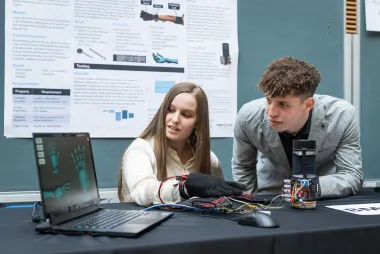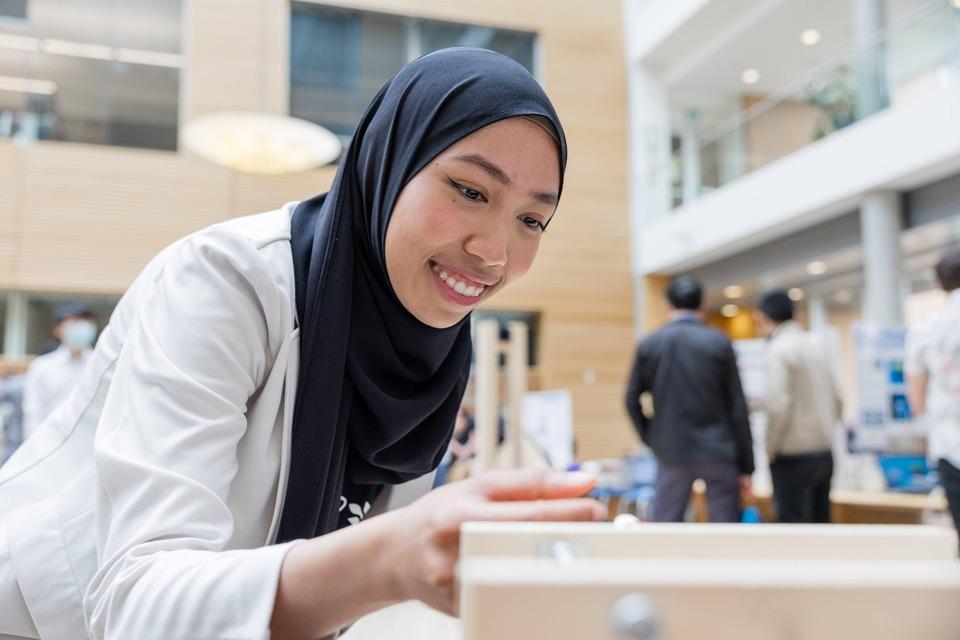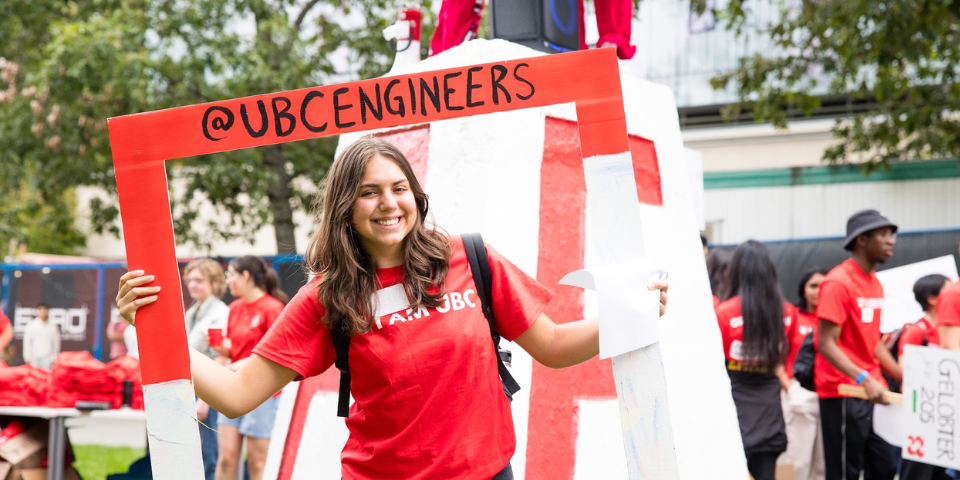
Students interested in the biomedical engineering program should select the Bachelor of Applied Science (Engineering) on the UBC admission application. Students will need to complete a supplementary form to express their interest in biomedical engineering. The Faculty of Applied Science will notify applicants at a later time when the supplementary form is available.
Start your application Learn about the Pre-BME Timetable
The new biomedical engineering program is offered in addition to a biomedical option available in the Departments of Electrical & Computer Engineering and Mechanical Engineering. For details on the biomedical option, visit Biomedical Engineering Options.
Please review BME FAQs if you have any questions.
Why study this program
Biomedical Engineering graduates are able to work in a variety of different fields. Common areas of focus they can pursue include: cell-based therapeutics, regenerative medicine, gene therapy, engineered organs, imaging technology: X-Rays, CT scans, ultrasound, MRI; neural engineering, wearable technology, surgical implants, surgical instrumentation, data mining, machine learning, drug design and gene finding to improve patient outcomes related to disease and pathophysiology.
Courses & specializations
The Pre-Biomedical Standard Time Table allows students to experience the foundational first year while beginning to dive deeper into biomedical engineering topics. Beginning in third year, you can specialize your technical electives, giving you an excellent background for a career in the ever-changing areas of industry, healthcare or research. For example, you may want to take courses related to the five following areas:
- Biomechanics
- Cellular and Molecular Engineering
- Biomedical Informatics
- Biomaterials
- Signals and Systems
Curriculum including first year
Sample courses
| Year 1 |
|---|
| Pre-Biomedical Standard Time Table |
| Year 2 | |
|---|---|
| BMEG_V 245 | The Fundamental Units of Life: From Cells To Systems |
| MATH_V 253 | Multivariable Calculus |
| BMEG_V 201 | Technical Communication for Biomedical Engineers |
| BMEG_V 230 | Biomechanics I |
| Year 3 | |
|---|---|
| BMEG_V 310 | Introduction to Bioinformatics |
| CHEM_V 233 | Organic Chemistry for the Biological Sciences |
| BIOC_V 202 | Introductory Medical Biochemistry |
| BMEG_V 357 | Biomedical Engineering Design II |
| Year 4 | |
|---|---|
| BMEG_V 455 | Professionalism and Ethics in Biomedical Engineering |
| BMEG_V 457 | Biomedical Engineering Design Project |
| STAT_V 300 | Intermediate Statistics for Applications |
Enhance Your Education (further education)
Graduates of the Biomedical Engineering program looking to continue their education can pursue professional programs and graduate studies. The analytical and problem-solving skills students gain from an undergraduate engineering degree translate well into the qualities needed for Medical and Law School. Students may also want to pursue a Master of Applied Science or Master of Engineering degree.
Careers
With an annual provincial median salary of $81,338 (source) and an expected growth rate of 1.7% over the next 5 years (source), Biomedical Engineering graduates are well positioned to pursue successful careers in medical institutions, research facilities, medical equipment and pharmaceutical manufacturers, corporate research and development labs, consulting engineering firms, and governments (source). Common career titles (source) for Biomedical Engineering graduates include: Biomedical Engineer or Clinical Engineer.
Employers
Both current students and graduates are able to work for a wide range of employers. Some of the biggest employers of UBC Biomedical Engineering students over the past several years include Vancouver Coastal Health, Kardium and Verathon Medical.
Alumni
Design Teams & Clubs
Design Teams
There are over 30 Engineering Design Teams at UBC. Joining an engineering design team is an excellent opportunity for students from all disciplines to collaborate on a wide variety of design projects and gain relevant teamwork, leadership, and technical skills transferrable to future careers. Design teams related to Biomedical Engineering include:
See full list of UBC’s Engineering Design Teams.
Clubs
There are many ways engineering students can get involved, including joining clubs relevant to their discipline. Relevant clubs include:
Research
The School of Biomedical Engineering is involved in research related to molecular and cellular engineering and synthetic biology, genomics and nano-devices, immune-engineering and advanced biomaterials, regenerative medicine, artificial intelligence and simulation systems with biomedical application, visualization and imaging from nanomolecular to physiological scales. These topics are explored in the following areas of research:
Cellular & Molecular Engineering
- Regenerative Medicine
- Synthetic Biology
- Immune-Engineering
Imaging & Computational Biology
- AI & Multiscale Imaging
- Bioinformatics/Systems Biology
- Computational Modelling
Human Interfacing Devices
- Therapeutic Delivery & Nanodevices
- Bionics & Biosensors
- Biomaterials
- Biomechanics & Injury Prevention
Minors & Dual Degrees
Engineering students are able to complement their studies with 5 Minors available or a Dual Degree with Arts. Students interested in a minor can apply to their chosen option in their third year of study. A minor or dual degree will likely extend your degree past 4 years.
Co-op
Participation in the Applied Science Co-op Education program gives students the opportunity to gain up to 20 months of paid relevant work experience during their degree. This experience provides an excellent opportunity for students to explore different industries, apply their studies to the working world, and create connections with future employers. The Co-op program will extend your four year degree to five years. Participation is optional and students apply to join Co-op in their second year of study.
International experiences
Students can embark on an unforgettable experience abroad while earning credits towards their engineering studies. Opportunities include the Coordinated International Experience (CIE) exchange program, the Go Global exchange program, and the Global Engineering Leadership courses. The CIE program is customized for Applied Science students and features 18 international partner institutions across 3 regions. All of the international experiences allow students to build an international network of peers, professors, and potential employers.












